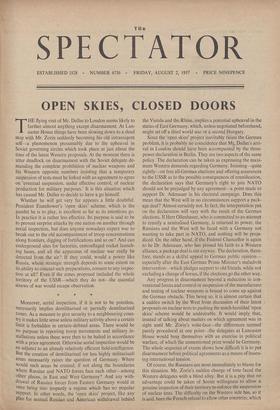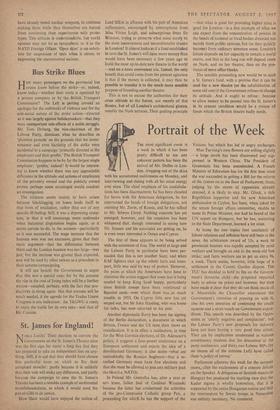OPEN SKIES, CLOSED DOORS
THE flying visit of Mr. Dulles to London seems likely to further almost anything except disarmament. At Lan- caster House things have been slowing down to a dead stop with Mr. Zorin suddenly becoming his old intransigent self—a phenomenon presumably due to the upheaval in Soviet governing circles which took place at just about the time of the latest Western proposals. At the moment there is utter deadlock on disarmament with the Soviet delegate de- manding the complete prohibition of nuclear weapons and his Western opposite numbers insisting that a temporary suspension of tests must be linked with an agreement to agree on 'eventual suspension, under effective control, of nuclear production for military purposes.' It is this situation which has caused Mr. Dulles to decide to have a go himself.
Whether he will get very far appears a little doubtful. President Eisenhower's 'open skies' scheme, which is the gambit he is to play, is excellent so far as its intentions go. In practice it is rather less effective. Its purpose is said to be to prevent surprise attacks by one nation on another through aerial inspection, but does anyone nowadays expect war to break out to the old accompaniment of troop concentrations along frontiers, digging of fortifications and so on? And can underground sites for factories, camouflaged rocket launch- ing bases, and all the apparatus of nuclear war really be detected from the air? If they, could, would a power like Russia, whose strategic strength depends to some extent on its ability to conceal such preparations, consent to any inspec- tion at all? Even if the zones proposed included the whole territory of the USSR—which they do not—the essential sinews of war would escape observation.
Moreover, aerial inspection, if it is not to be pointless, necessarily implies demilitarised or partially demilitarised zones. As a measure to give security to a neighbouring coun- try it makes little sense unless military activity above a certain limit is forbidden in certain-defined areas. There would be no purpose in reporting troop movements and military, in- stallations unless these were then to be halted in accordance with a prior agreement. Otherwise aerial inspection would be an adjunct to an already relatively efficient field-intelligence. But the creation of demilitarised (or less highly militarised) areas necessarily raises the question of Germany: Where would such areas be created, if not along the boundaries where Russian and NATO forces face each other—among other places, in East and West Germany? And any with- drawal of Russian forces from Eastern Germany would at once bring into jeopardy a regime which has no popular support. In other words, the 'open skies' project, like any plan for mutual Russian and American withdrawal behind the Vistula and the Rhine, implies a potential upheaval in the status of East Germany, which, unless negotiated beforehand, might set off a third world war or a second Hungary.
Since the 'open skies' project inevitably raises the German problem, it is probably no coincidence that Mr, Dulles's arri- val in London should have been accompanied by the three- power declaration in Berlin. They are two aspects of the same policy. The declaration can be taken as expressing the maxi- mum Western demands regarding Germany. Insisting—quite rightly—on free all-German elections and offering assurances to the USSR as to the possible consequences of reunification, the declaration says that Germany's right to join NATO should not be prejudged by any agreement—a point made to support Dr. Adenauer in his electoral campaign. Does this mean that the West will in no circumstances support a pack- age deal? Almost certainly not. In fact, the interpretation put on the declaration will vary with the result of the German elections. If Herr 011enhauer, who is committed to an attempt to reunify a neutralised Germany, is returned to power, the Russians and the West will be faced with a Germany not wanting to take part in NATO, and nothing will be preju- diced. On the other hand, if the Federal Chancellor is again to be Dr. Adenauer, who has pinned his faith to a Western alliance, a package deal is out anyway. The declaration, there- fore, stands as a skilful appeal to German public opinion— especially after the East German Prime Minister's maladroit intervention—which pledges support to old friends, while not excluding a change of horses, if the elections go the other way.
Any progress in disarmament beyond a reduction in con- ventional forces and control or suspension of the manufacture and testing of nuclear weapons is bound to come up against the German obstacle. This being so, it is almost certain that a sudden switch by the West from discussion of their latest proposals on nuclear tests to pushing the much-heralded 'open skies' scheme would be undesirable. It would imply that, instead of talking about matters on which agreement was in sight until Mr. Zorin's volte-face—the differences seemed purely procedural at one point—the delegates at Lancaster House would busy themselves with an exercise in political warfare, of which the unmentioned prize would be Germany. The whole sequence of events shows how difficult it is to put disarmament before political agreements as a means of lessen- ing international tension.
Of course, the Russians are most immediately to blame for this situation. Mr. Zorin's sudden change of tone faced the Western delegates with a blind alley. But it is a pity that no advantage could be taken of Soviet willingness to allow a genuine inspection of their territory to enforce the suspension of nuclear tests. The difficulty on the Western side has, so it is said, been the French refusal to allow other countries, which
cess the play had here (and indeed it did not break the records indicated) was due to the professional talents of the producer and cast who made many cuts and revisions of the script during production. Pos- sibly, had the playing script been submitted, the judgment of other managers might have been
different.—Yours faithfully, BRYAN BAILEY
The Guildford Theatre Company PUFFS DIRECT































 Previous page
Previous page